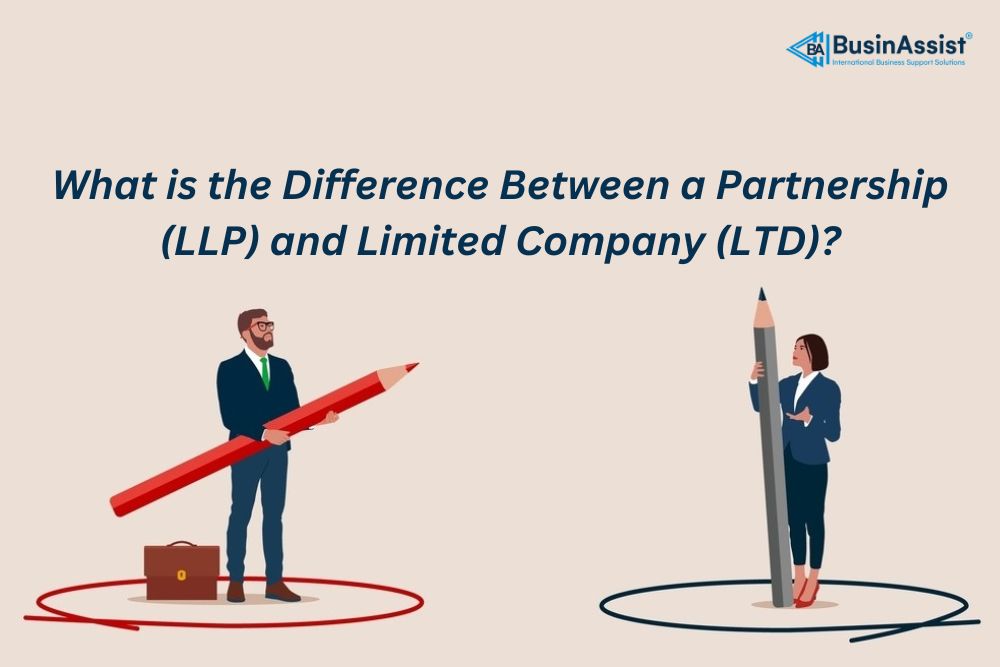Last Updated on December 18, 2025 by Joy Kyalo

Difference Between Partnership (LLP) and Limited Company (LTD)
When deciding a legal structure for your business, often two popular options may come to mind; limited company (LTD) and limited liability partnership (LLP). This guide will give explanations on the differences, pros and cons of having a partnership and a limited company, with consideration on the advantages and disadvantages of each structure.
What is the difference between partnership and limited company?
The difference between partnership and limited company lies in their structure, how they operate, and legal aspects.
A limited liability partnership (LLP) is a blend of a limited company and a traditional partnership. On the other hand, a limited company (LTD) is a separate legal entity from those who run it. It offers protection to its directors, owners, and shareholders, allowing them to separate personal assets from business debts.
What are the features of a Limited Liability Partnership (LLP)?
- A hybrid structure that combines a traditional partnership and a limited company.
- Has a separate legal entity that impacts the liability of the partners.
- LLP partners/ members have a limited liability protection for debts and obligations of the business.
- Members have a partnership agreement known as Members Agreement, that outlines the responsibilities, rights, and duties of each partner.
- LLP does not have shareholders, instead it has members or partners. The LLP structure contains two types of LLP members: designated members and ordinary members.
- LLP does not pay taxes at the entity level meaning that profits and losses flow directly to an individual partner.
- Partners manage business together and share in the profits and losses.
What are the advantages of having a Limited Liability Partnership (LLP)?
LLPs are easier to form since they don’t require extensive filings with the Companies House. Designated members are responsible for filing annual accounts and an annual confirmation statement with Companies House. Partners have also a lower audit level unless they exceed specified turnover.
LLPs offer significant tax advantages since partners are not subjected to entity level tax. Profits and losses flow directly to partners who report them on their income tax.
LLP’s name is protected by law preventing rivals from using a similar name. This enhances recognition and trust.
Additionally, LLPs offer individual liability protection. Each partner’s liability is limited to their investments and their assets are protected from business debts. This gives partners the flexibility in management and decision making.
LLP can appoint two companies as members as opposed to a limited company where it has to have at least one known director.
Partners are able to leverage their unique strengths since LLPs allow unequal distribution of management duties. It is possible to have no management authority and maintain equal rights. Partners share management responsibilities equally or as agreed upon.
What are the disadvantages of having a Limited Liability Partnership (LLP)?
LLP cannot survive independently, it must have at least two members to operate. If one member decides to leave, it will potentially lead to dissolution of the partnership.
Partnership has lack of privacy. As a legal entity, LLP has disclosure requirements which require them to file financial documents at Companies House. This makes the documents public and lack of privacy can be a concern to some partners.
LLP cannot retain profits within the business. All earned revenue is distributed without holding earnings to the next tax year.
Raising capital can be difficult for LLP since it offers personal liability protection. This makes it difficult for investors to invest in an entity they won’t have control over.
What are the features of a Limited Company ?
- Can be owned and managed by one person.
- Has a limited status that is appealing to investors, lenders, and clients.
- It is a legal entity on its own separating a company’s assets and finances from those of its directors and shareholders.
- It is tax efficient allowing effective tax planning.
- Has a limited liability. Shareholders are only liable to the value of their shares.
- Able to sell shares incase of financial difficulty.
What are the advantages of having a Limited Company?
Being a separate legal entity from its owners, it has a limited liability which ensures personal assets that belong to the business owner are protected in the event of debt or insolvency.
Limited company set-up has an easy registration process. The Companies House simplifies the process of setting up a limited company.
Unlike LLP, limited companies can choose when and how to distribute profits allowing for strategic tax planning.
Tax advantages. Limited companies pay corporation tax on their profits, however, there is a small profit rate for companies with profit of £50,000 or less.
Operating as a limited company may qualify you for various government incentives such as grants and tax relief.
It is easier to transfer ownership. You can transfer the business to new owners or bring in investors. Incase of financial difficulties, you may sell the business via shares.
Limited company enhances your professional level. It increases credibility with clients, partners, and suppliers.
What are the disadvantages of having a Limited Company?
Having a separate legal entity can be a disadvantage since the company itself can be sued.
Limited companies must adhere to formal legal requirements outlined by Companies Act. Directors have certain legal responsibilities which may lead to hefty fines in case one doesn’t comply with them.
Running a limited company involves more administrative tasks and filing requirements with Companies House such as annual confirmation statements, annual accounts which may require hiring professionals.
Company details are available on public record, reducing the privacy of your business. Companies House has an online website where all limited companies can be searched.
Overall, partnerships and limited companies can both offer significant benefits, but they also come with drawbacks. You should carefully study the pros and cons of each type of company and make a decision based on your circumstances.
Read Also:
- Can i Change my Limited Company Name: The Ultimate Guide
- How to Start a Business in 2024 in the UK with a Small Budget
- What are the Advantages and Disadvantages of being VAT Registered?
- Everything You Need to Know About Companies House Default Address
- Understanding the Difference Between Limited and Unlimited Liability: What You Need to Know
- Advantages and Disadvantages of Running your Business through a Limited Company?
- What Are the Disadvantages of a Dormant Company?
- What is a Certificate of Incorporation and How Can one be Obtained? 2024 Guide
- Revolut vs Monzo: Which Is Right for You?

The BusinAssist Editorial Team has 15+ years of experience writing about small business and company formation in the UK, Canada, and the USA. We simplify complex processes and provide practical insights to help entrepreneurs succeed. Business Assist with BusinAssist – your partner for business success.

